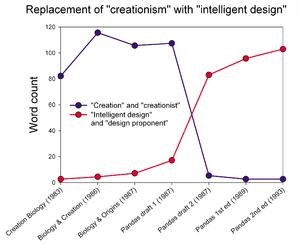
Kitzmiller v. Dover Area School District was the first direct challenge brought in the United States federal courts against a public school district that required the presentation of Intelligent Design as an alternative to evolution. The plaintiffs successfully argued that Intelligent Design is a form of creationism, and that the school board policy thus violated the Establishment Clause of the First Amendment to the United States Constitution.
Eleven parents of students in Dover, Pennsylvania, sued the Dover Area School District over a statement that the school board required be read aloud in ninth-grade science classes when evolution was taught. The plaintiffs were represented by the American Civil Liberties Union (ACLU), Americans United for Separation of Church and State (AU) and Pepper Hamilton LLP. The National Centre for Science Education (NCSE) acted as consultants for the plaintiffs. The defendants were represented by the Thomas More Law Centre. The suit was tried in a bench trial from September 26, 2005 to November 4, 2005 before Judge John E. Jones III. Ken Miller, Kevin Padian, Brian Alters, Robert Pennock, Barbara Forrest and John Haught served as expert witnesses for the prosecution. Michael Behe, Steve Fuller and Scott Minnich served as expert witnesses for the defence.
On December 20, 2005 Judge Jones issued his 139-page findings of fact and decision, ruling that the Dover mandate was unconstitutional, and barring Intelligent Design from being taught in Pennsylvania’s Middle District public school science classrooms. The eight Dover school board members who voted for the Intelligent Design requirement were all defeated in a November 8, 2005 election by challengers who opposed the teaching of Intelligent Design in a science class, and the current school board president stated that the board does not intend to appeal the ruling.


Be First to Comment